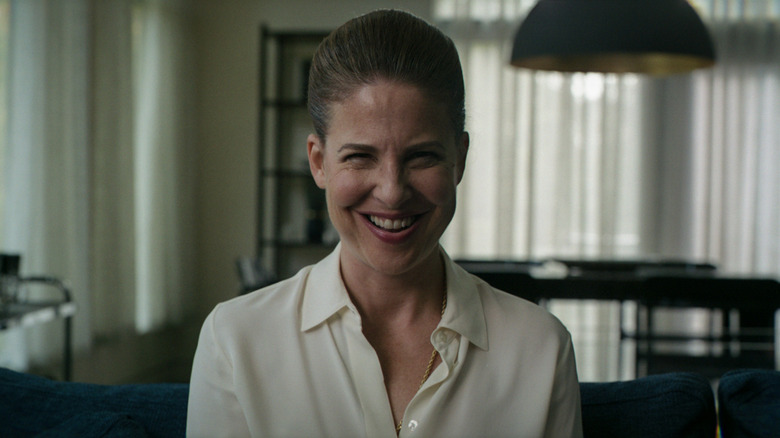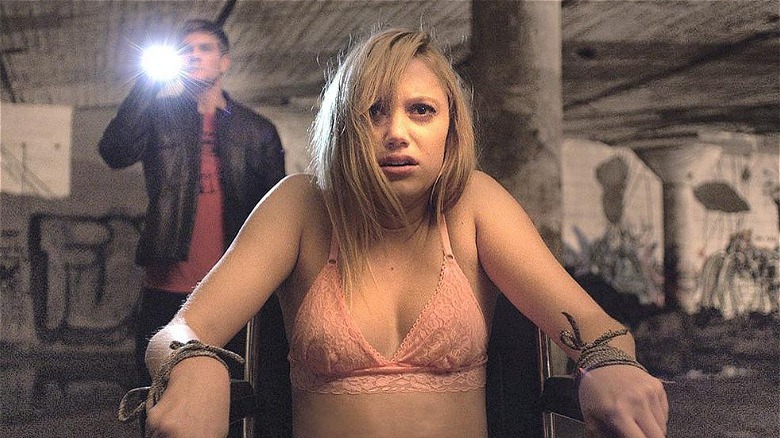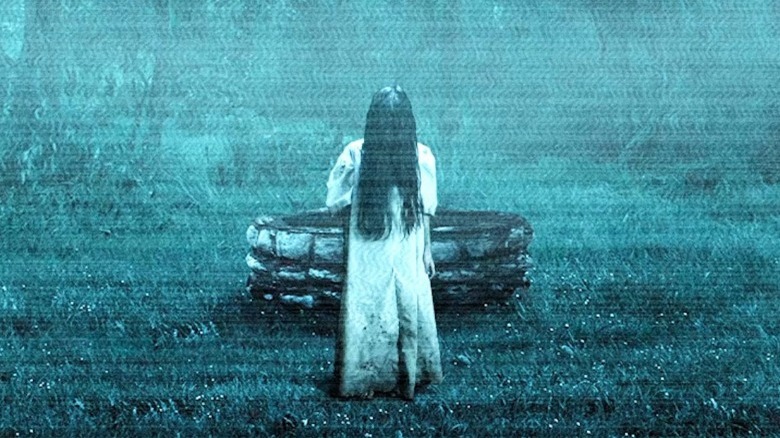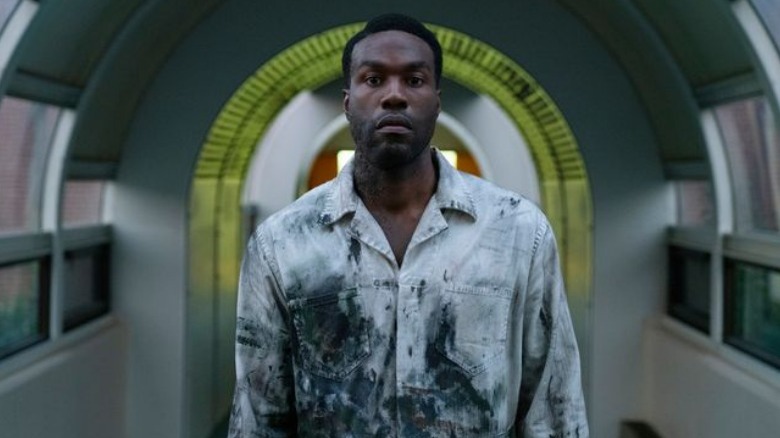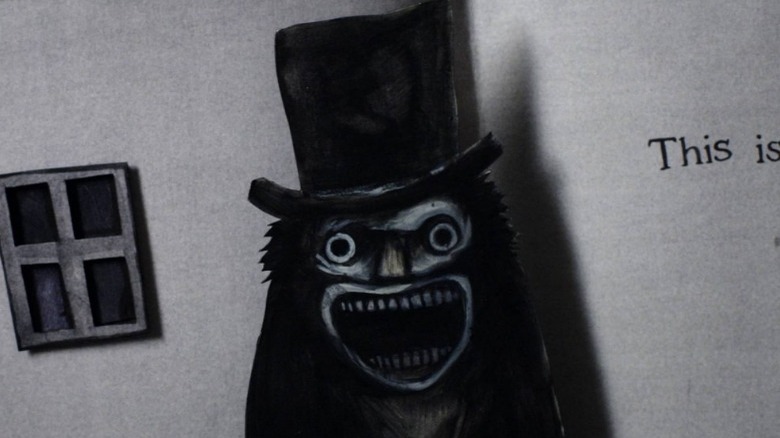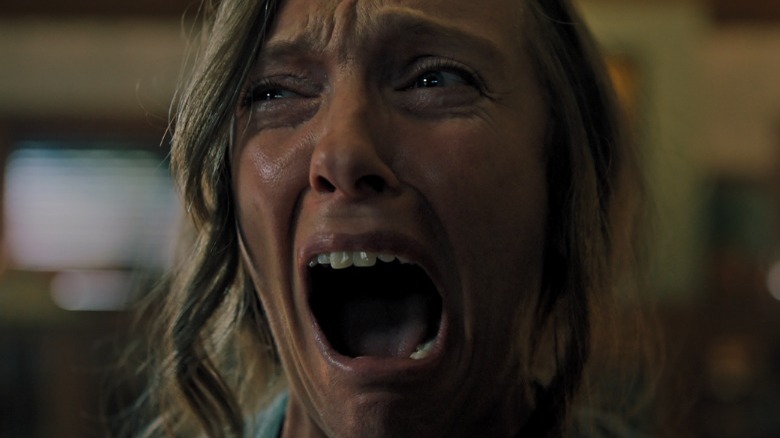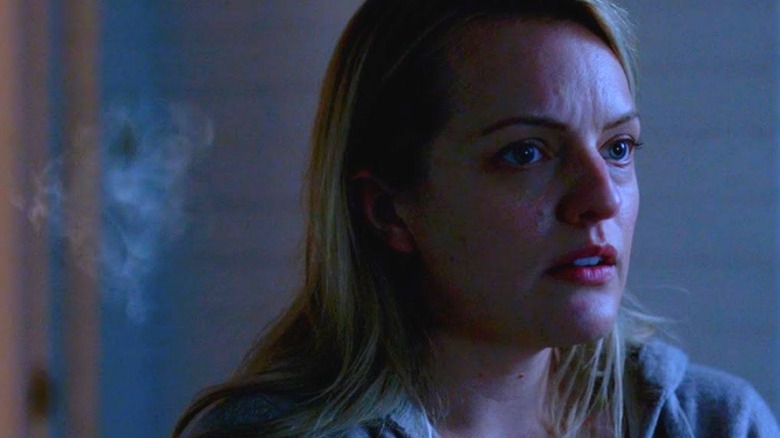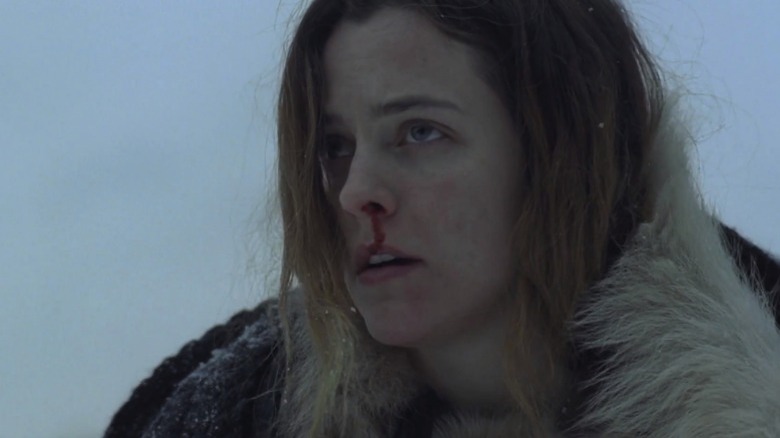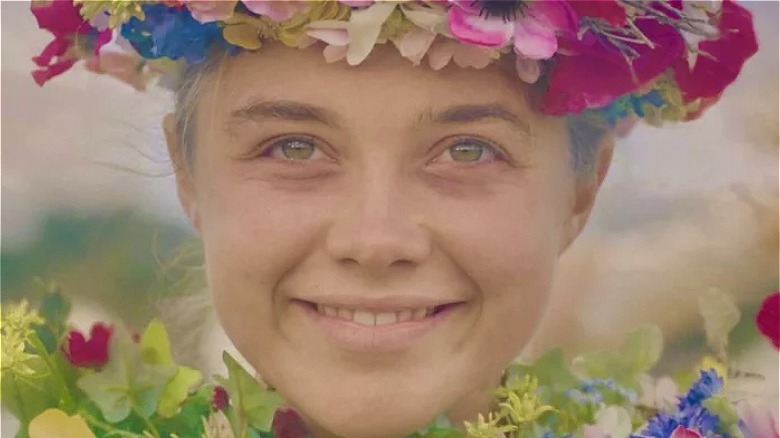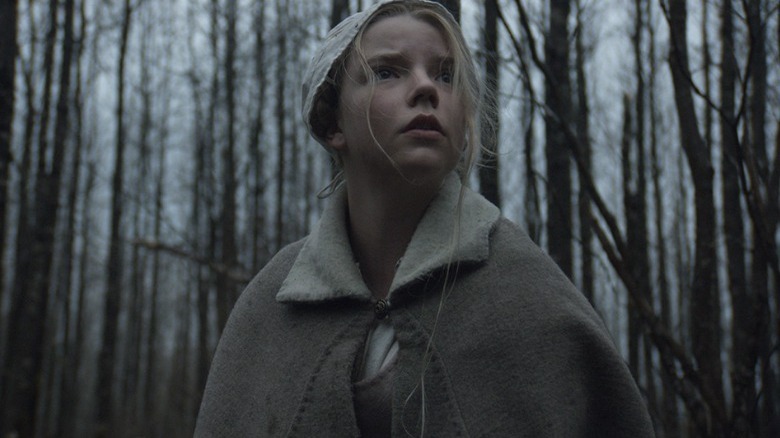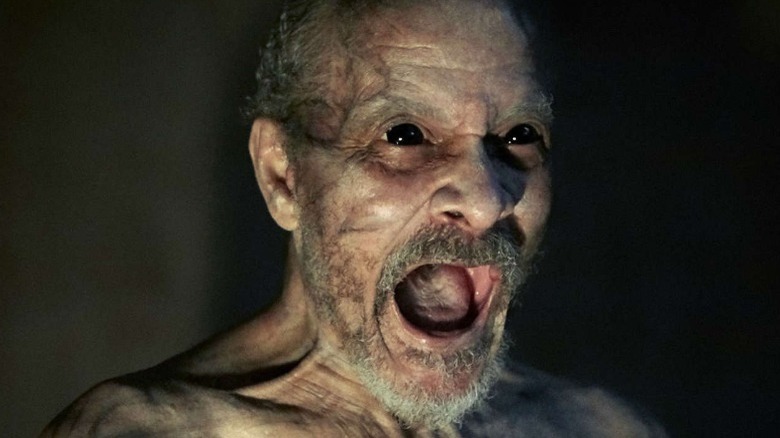10 Movies To Watch If You Loved Smile
"Smile" follows Rose (Sosie Bacon), a psychiatrist in the emergency psych ward at her local hospital. A new patient says she's being followed by something that "wears people's faces like masks." She then takes her own life in front of Rose. Soon after, Rose starts seeing bizarre and terrifying visions of friends and strangers who all exhibit eerie grins. With the help of her police officer ex-boyfriend, Rose discovers that she's been cursed and searches for a way to break the cycle. The film combines jump scares, visceral terror, slow burn creep-outs, and psychological trauma into one independent horror movie.
With Halloween just around the corner, audiences are hungry for more movies to freak them out. If you loved "Smile," you've come to the right place. We've carved out a list of 10 movies that will surely burrow under your skin and make you want to sleep with a night light. From fun spooky flicks like "The Ring" to gut-wrenching arthouse horror like "Hereditary," there's something here for every fan of the macabre. You may want to binge some cartoons after marathoning these merciless moviegoing experiences.
If you or anyone you know is having suicidal thoughts, please call the National Suicide Prevention Lifeline by dialing 988 or by calling 1-800-273-TALK (8255).
It Follows
The movie that "Smile" draws the most comparisons to is 2014's "It Follows." Both center on a female protagonist who is the victim of a mysterious curse, a ticking clock, incredible performances, shocking kills, and a creepy atmosphere. While "Smile" takes the simple act of smiling and makes it terrifying, "It Follows" crafts its scares from something that's been exploited in horror for decades, sex. Most early slashers are thinly veiled in their anti-drug and anti-sex attitudes. Watch any "Friday the 13th" film and see who dies first. "It Follows" takes that concept and runs with it (well, walks with it very slowly) in the creepiest way imaginable.
The film follows Jay (Maika Monroe), who has a sexual encounter and wakes up tied to a chair with a figure ambling towards her. She soon learns there's a curse transferred through sex, and she now has to have sex with someone else to pass it on, or she'll die. The stakes are clear when the movie's first victim dies in the middle of a suburban street, hideously twisted into a human pretzel. There are also multiple interpretations of the film's deeper meanings, including this fantastic take from Bloody Disgusting: "It Follows is an anti-victim blaming masterpiece that gives a huge middle finger to the genre's antiquated approach to sex." While this film ends on a more hopeful note than "Smile," there is still the feeling that "it" is never really gone.
The Ring (2002)
Another obvious comparison is the American remake of "The Ring." Naomi Watts plays Rachel, a journalist who fixates on solving her teenage niece's mysterious death. She finds the world's creepiest home video of a long-haired girl crawling out of a well, and it turns out that once you've seen it, you have just seven days to live. Nightmarish visions and voices plague Rachel, but the stakes are doubled when her son watches the video, too. Now she has to fight to save herself and her family. It's a nerve-shredding ride with some of the most iconic visuals in early 2000s horror.
"The Ring" and "Smile" both have a feeling of inevitability. Something awful is coming for both protagonists, and it seems like nothing can stop it. One could look at this as a metaphor for death. We all know it's coming. We don't know when, but the threat is looming every day. Both add a creepy supernatural element to something relatively innocuous. "The Ring" also perfectly balances jump scares with slow, unbearable tension, and it has one of the best endings in modern horror history. As /Film's Meagan Navarro explains, "The Ring subverted expectations by lulling audiences with a false payoff to deliver a far more terrifying truth; There's no happy ending here. Just a lingering doom and a bleak outlook heralded by one skin-crawling harbinger of death." A great horror movie sticks with you when you leave the theater, and "The Ring" has stuck with audiences for decades.
Candyman (2021)
The 2021 "Candyman" is a sequel to the first film that pretty much erases the two original sequels. Driving home themes that the original "Candyman" only touched on and building the lore and gore along the way, the new film offers a profound social commentary about gentrification, police brutality, generational trauma, and how art can explore or exploit all of this. As /Film's Chris Evangelista writes, "The original film dealt with Black communities living in Chicago's Cabrini Green projects, but for the most part, it was a story told entirely from a white person's POV. The new "Candyman," however, is offering up a Black perspective — the film has been made all the more timely by processing racial violence through storytelling."
The sequel follows Anthony McCoy (Yahya Abdul-Mateen II), a painter experiencing artist's block, searching for something authentic and inspiring. He finds this in Cabrini-Green, a housing project in Chicago that luxury condos have now erased. Anthony is told of the countless instances of racial violence perpetrated there and the legend of each generation's Candyman that rises out of those acts of violence. Anthony becomes obsessed with these stories. The movie expertly balances urban legend, body horror, jump scares, and graphic violence. It's bleak and harrowing but also really entertaining. The film never feels too heavy-handed, the themes are evident, but the main focus is always to entertain and scare the audience.
The Babadook
"The Babadook" and "Smile" share similar DNA. Both deal with a broken family after an unresolved trauma. In "Smile," it's the mother's overdose when her daughters were young. In "The Babadook," the father's death opens Amelia (Essie Davis) and her son, Sam (Noah Wiseman), to an evil entity's control. Just as a smile can be a source of terror, a children's pop-up book about Mister Babadook can also instill fear. Parents can relate to this. There are some highly suspect children's books out there. The film takes a tragic event and adds a horror twist when a grief monster appears to haunt the mother and son.
The true terror in "The Babadook" is the idea that one may never fully recover from the death of a parent and how that loss lingers. We are never really sure if Mister Babadook is real or all in the characters' minds. Either way, Mr. Babadook's cartoonishly exaggerated expressions and haunting features are enough to sear those images into our minds for years to come. This film differs from "Smile" with a slightly more hopeful ending. While both films are deeply unsettling, the message of "The Babadook" seems more in line with the film's themes and gives the audiences enough scares without having them leave the theaters as complete nihilists.
Hereditary
Just when you thought this list couldn't get any more depressing, along comes Ari Aster's "Hereditary," a film that combines the hereditary nature of mental illness with an evil cult and one of the most shocking deaths in recent memory. Aster uses a horror lens to examine the unimaginable grief of losing a child and how that can destroy the family unit. Toni Collette's performance is Oscar-worthy — if only Academy members weren't running for the exits in the film's first 20 minutes.
"Hereditary" follows Annie (Collette) and her family in the wake of her mother's passing. Her daughter, Charlie (Milly Shapiro), claims to see ghosts. Her son, Peter (Alex Wolff), tries to separate himself from his family's oddness. Annie's psychiatrist husband, Steve (Gabriel Byrne), is ever the skeptic. When Annie discovers a box that belonged to her mother chock full of strange spiritual items, it ominously foreshadows what's in store. Then, Charlie dies in one of the most shocking moments ever. The gut-wrenching horror comes from the aftermath of Charlie's death, the family's deterioration, and Peter's guilt for being the cause of it. Within this realistic story of grief, Aster seeds a supernatural presence that slowly builds to a bloody climax.
The Invisible Man (2020)
Released in 2020, "The Invisible Man" takes a classic horror film and masterfully reinvents it for a modern audience. Yes, both have an invisible man as their central antagonist, but the similarities between this version and the 1933 original end there. In "The Invisible Man," Cecilia (Elisabeth Moss) has to convince everyone that her dead ex-boyfriend is after her — just as Rose in "Smile" is fighting to get people to believe she's cursed. Both are trapped in impossible circumstances, and their oppressors strategically isolate them from their friends and family as part of their malicious torment.
The new film brilliantly weaves in themes from the #MeToo era without making anything too overt. In the film's opening, Cecilia narrowly escapes her toxic and abusive rich boyfriend, Adrian (Oliver Jackson-Cohen), and hides at a friend's house to wait for the dust to settle. When she gets word that Adrian was found dead from an apparent suicide, she has no idea her nightmare is only beginning. Soon, an invisible presence begins to stalk her. Initially, it's subtle but builds to violent physical attacks. Luckily, director Leigh Whannell has a satisfying ending in store. Let's just say Adrian gets a taste of his own medicine.
The Lodge
"The Lodge" might take the prize for the bleakest film on this list, which is saying a lot. It begins with Laura (Alicia Silverstone) finding out that her ex-husband, Richard (Richard Armitage). is now in love with Grace (Riley Keough), who was one of the subjects of his book on cult survivors. Laura commits suicide, leaving behind her two children, Aiden (Jaeden Martell) and Mia (Lia McHugh). Six months later, Richard decides it's time for the family to try and heal and for the kids to get to know Grace. At first, Aiden and Mia seem like your average angry stepkids, but when their father is called away on business, leaving Grace alone with his kids in a snowed-in remote cabin, their darker side is revealed.
Grace, who witnessed a horrific act as the sole survivor of a Heaven's Gate-type cult, tries to bond with Aiden and Mia. When Aiden and Mia discover Grace's sordid past, they decide to exploit and toy with her previous extreme beliefs. What follows is a series of events in which neither Grace nor the audience knows if what's happening is real or in her head. It's a psychological slow burn focusing on building dread and unease instead of jump scares. The less you know about the movie going into it, the better. Fair warning: "The Lodge" is not for the faint of heart and features an ending that'll disturb you long after the images fade.
Midsommar
"Midsommar" is Ari Aster's second feature film, and while it's not as bleak as "Hereditary," it's just as memorable because of its sun-drenched, brightly colored horror vibe. As if trying to top the family trauma of "Hereditary," Aster opens this film with Dani (Florence Pugh) finding out her sister has committed suicide and killed her parents by filling their house with carbon monoxide. Emotionally, it's a rough start, but if you can get past the opening 10 minutes, the rest of the film sprinkles in dark comedy with a relationship drama and fantastic folk horror elements. It's a unique cinematic treat.
After the film's opening tragedy, the focus shifts to Dani, her boyfriend Christian (Jack Reynor), and their strained relationship. They've been together for four years, and Christian intends to break it off, but he feels guilty and decides to stay with Dani. This inability to end things leads him to reluctantly invite Dani on his trip to a midsummer festival at the Hårga, a commune where his friend grew up in rural Sweden. What starts as a seemingly peaceful hippy party with psychedelic mushrooms turns dark when the friends witness a ceremony involving two older commune members willingly jumping off a cliff to their deaths. From there on, things only get stranger and more hallucinogenic as Aster crafts one of the silver screen's most bizarre, blackly comedic, and horrific break-up movies.
The Witch
As seen by the large gap in Rotten Tomatoes scores, "The Witch" is a movie that critics universally loved and audiences found divisive. Some viewers weren't fans because it's not your standard witch movie. There are a few appearances of witches, but they are brief and not the main focus. Instead, director Robert Eggers' feature debut focuses on the horrors of fundamentalism and how paranoia and distrust can eat away at the family unit, allowing evil to snake its way in. With nearly every scene instilling a deep sense of unease, "The Witch" is soaked in dread.
William (Ralph Ineson), his wife Katherine (Kate Dickie), and their four children are banished from their village, hinting their beliefs were too extreme for their fellow Puritans. They build a farm in a secluded area surrounded by a forest, where their fifth child, Samuel, is born. The eldest daughter, Thomasin (Anya Taylor-Joy), claims to be a witch to scare her younger siblings, and shortly after, Samuel disappears while under her watch. When the family's fervent prayers go unanswered, their crops begin to whither, and their son Caleb (Harvey Scrimshaw) dies, the family is sent into a paranoid spiral, believing this may all be Thomasin's fault. Don't expect jump scares or typical witch movie cliches. Eggers defies every expectation of what audiences may think this movie should be, and it's all the more memorable and eerie because of it.
It Comes at Night
"It Comes at Night" is a haunting apocalyptic horror drama that suffers from a misleading trailer and a title that defines false advertising. You might think you're in for a new take on the zombie genre about a family surviving in the woods after an outbreak. That is only partly true, and the real focus is on anticipation and dread. After an unexplained virus consumes the planet, Paul (Joel Edgerton) and Sarah (Carmen Ejogo) along with their teenage son, Travis (Kelvin Harrison Jr.), survive in a cabin deep in the woods. Another family happens upon them, and Paul hesitantly allows them to stay as long as they follow his strict rules. One night Travis' dog goes missing, and everything unravels into mistrust, fear of infection, and violence.
This film seems all the more terrifying and relevant after the dawn of the COVID-19 pandemic. Paul's single-minded focus on keeping his family safe, the meticulous rules for avoiding infection, and the eventual disintegration of trust among his houseguests seem like an all-to-real cautionary tale. This movie is all psychological horror. Nothing comes at night (or even during the day) as the title suggests. Instead, what unfolds is a bleak look at how the fear of an unseen virus can lead a family man and devoted husband to do monstrous things. When it comes to tragic endings, this one is close to "The Lodge" and not recommended for audiences that enjoy even a glimmer of hope.
